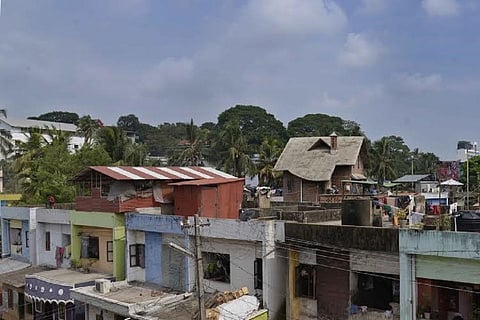

Community spread of COVID-19 has been confirmed in Thiruvananthapuram, which has the most number of cases in Kerala. However, a colony with over 1,500 families is doing everything possible to ensure that it does not see a single positive case.
Earlier known as the Chengalchoola slum, Rajaji Nagar has a few government apartment buildings, some huts and some sheds. In some flats in the government buildings, the small apartments house more than 10 people.
The area is congested and has narrow roads, and staying home is not a choice for many as they are daily wage labourers and cannot skip work. These factors have made the area vulnerable, but no case of COVID-19 has been reported from the area.
While the colony has multiple entrances, one is greeted with the same board put in place by the colony’s residents at all of them — “At this time of coronavirus, to protect the people of the colony, outsiders and traders from outside are not allowed to enter.”
“A bunch of youngsters, men and women, formed a group to spearhead containment activities inside the colony. They placed these boards and always kept an eye out to ensure nobody breaks the rule,” says M Jayelakshmi, the Thampanoor Municipal Ward Councilor, where the colony falls.
Relatives of residents are also not allowed to visit the colony.
Jayelakshmi adds that the youngsters kept soap and water at all the entrances, and anyone leaving the colony for work is not allowed to re-enter until they wash up. “These youngsters also keep a vigil at houses where people go out for work. They stay updated on the areas and institutions where the cases are reported. If anybody from the colony goes to these places for work, they are told to isolate themselves," Jayalekshmi says.
However, those who supply goods to the colony, as well as outsiders who run shops inside the colony and weren’t allowed to enter did not like the restrictions.
Suresh, one of the youngsters from the colony, said that these are difficult times, and they will have to live with whatever is available.
“No goods vehicles are allowed inside. We have arranged supplies for whoever wants milk or other essentials. Other essentials are distributed through a ration system. If we relax, we will suffer. That is what we saw in the coastal areas of the district. We can’t afford to have a case here, because there are many aged and sick people as well as small children with severe illness. Life is more important,” he says.
The residents are fully cooperating with the restrictions.
For those returning from other states, the group also arranges a place to stay for them in order to isolate themselves.
In addition to all this, the group frequently makes announcements over speakers inside the colony to spread awareness. The expenses of all this were borne by the group themselves.
"We also make sure that everyone wears masks even inside their houses. No shops other than that of the residents are not allowed to open," Suresh adds.
Appreciating their efforts, ward councillor Jayalekshmi says that it has been effective so far.
According to her, they struggled to impose restrictions in the area before the youngsters stepped in.
"All were daily wage labourers and they weren't able to sit inside. We provided food from community kitchens to all those who asked for it and continuously tried to raise awareness. It was later that these youngsters stepped forward. They asked me for help and I have provided them whatever possible. Now, they are starting a disinfection drive in the colony for which I will arrange bleaching powder and phenyl to clean all the areas and houses in the colony," Jayalekshmi adds.